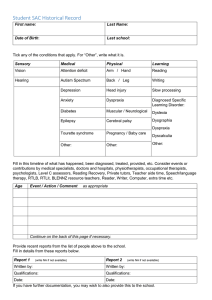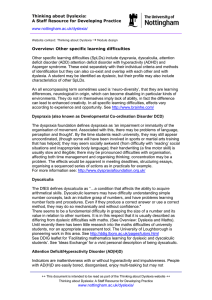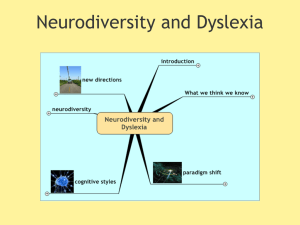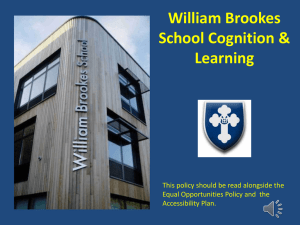TCD SpLD Screening Application Form.doc
advertisement
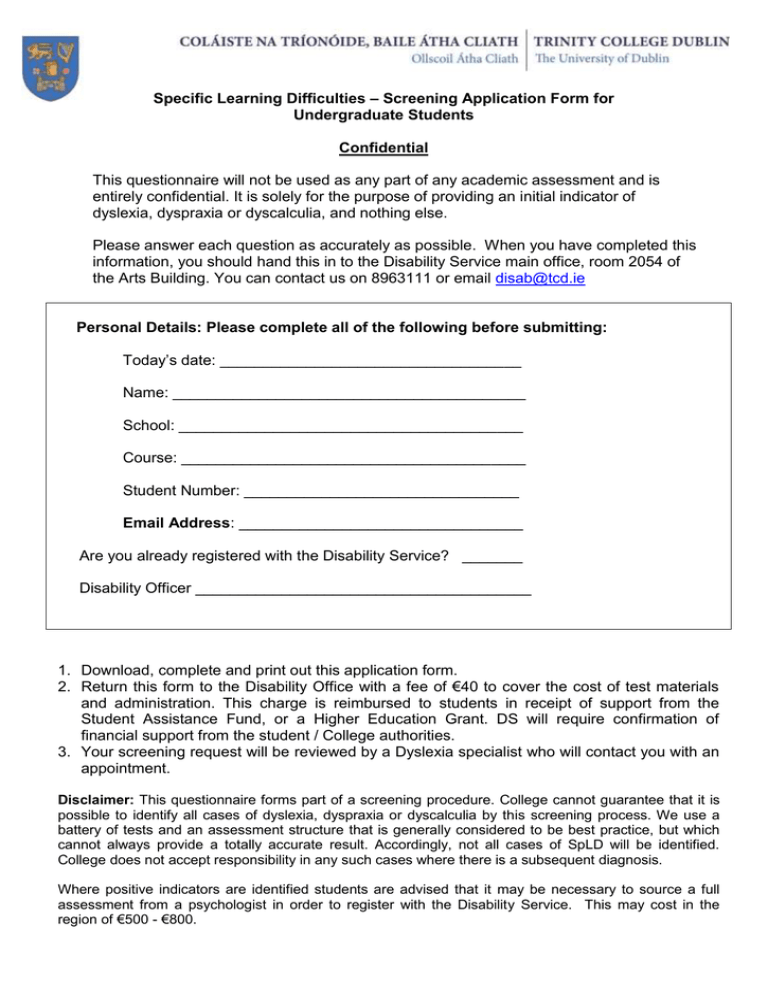
Specific Learning Difficulties – Screening Application Form for Undergraduate Students Confidential This questionnaire will not be used as any part of any academic assessment and is entirely confidential. It is solely for the purpose of providing an initial indicator of dyslexia, dyspraxia or dyscalculia, and nothing else. Please answer each question as accurately as possible. When you have completed this information, you should hand this in to the Disability Service main office, room 2054 of the Arts Building. You can contact us on 8963111 or email disab@tcd.ie Personal Details: Please complete all of the following before submitting: Today’s date: ___________________________________ Name: _________________________________________ School: ________________________________________ Course: ________________________________________ Student Number: ________________________________ Email Address: _________________________________ Are you already registered with the Disability Service? _______ Disability Officer _______________________________________ 1. Download, complete and print out this application form. 2. Return this form to the Disability Office with a fee of €40 to cover the cost of test materials and administration. This charge is reimbursed to students in receipt of support from the Student Assistance Fund, or a Higher Education Grant. DS will require confirmation of financial support from the student / College authorities. 3. Your screening request will be reviewed by a Dyslexia specialist who will contact you with an appointment. Disclaimer: This questionnaire forms part of a screening procedure. College cannot guarantee that it is possible to identify all cases of dyslexia, dyspraxia or dyscalculia by this screening process. We use a battery of tests and an assessment structure that is generally considered to be best practice, but which cannot always provide a totally accurate result. Accordingly, not all cases of SpLD will be identified. College does not accept responsibility in any such cases where there is a subsequent diagnosis. Where positive indicators are identified students are advised that it may be necessary to source a full assessment from a psychologist in order to register with the Disability Service. This may cost in the region of €500 - €800. Please tick YES, NO or DON’T KNOW to each question. Do not omit any questions. 1. Educational History Yes No Don’t know Office use Have you ever been diagnosed with dyslexia / dyspraxia / dyscalculia? Has anyone in the past suggested to you that you might have dyslexia / dyspraxia / dyscalculia? Did you receive extra learning support at school or college? Did you get extra time for exams at school or college? Have you previously had an assessment for a specific learning difficulty? If yes, please provide as much information as possible about this previous assessment, in the text box below. For example, when did the assessment take place, where and by whom were you tested, do you have a copy of the dyslexia report? 2. Sight, Hearing Speech and Language Yes No Don’t know Office use Yes No Don’t know Office use Yes No Don’t Know Office use Have you ever used a coloured overlay or had tinted lenses to help you with reading? Do you find looking at black print on white paper uncomfortable to read? Do you have any current or past problems with your hearing? Did you have speech problems as a child or ever see a speech therapist? Do you sometimes forget words or use the wrong word when speaking aloud? 3. Coordination and Organisation Do you consider yourself to be accident prone or clumsy? Do you have problems playing team sports, hand eye coordination or dancing? Do you have difficulty knowing left from right? Do you struggle with directions / finding your way to places? Do you feel generally disorganised or muddled? Do you easily lose track of time? Do you find it difficult to concentrate for periods of time? 4. Memory Do you find it hard to listen to and retain verbal information / spoken instructions? Do you get confused over dates and times and sometimes miss appointments? Do you feel that you have general problems with your memory? 5. Past and Current Difficulties Yes No Don’t know Office use As a child, did you find it difficult to learn to read? Do you have difficulties with reading now? Do you have difficulties with spelling accurately? As a child, did you find it difficult to learn your multiplication tables? Is your handwriting untidy or difficult to read? Do you find it hard to make notes in lectures? Do you always have enough time to finish in exams? Do you always manage to meet deadlines for assignments? Do you have difficulty with planning and structuring your written work? Do you often feel like you know what you want to say, but can’t get it down on paper? Do you have difficulty proofreading and spotting mistakes in your written work (without a spellchecker)? Do you have difficulty expressing yourself verbally? 6. Family History Yes No Don’t know Office use Yes No Don’t know Office use Do any of your family members have dyslexia, dyspraxia or dyscalculia? 7. Reading When reading do you find reading difficult and tiring? read more slowly than others? often not finish set reading tasks? sometimes forget what you have just read? have to read text more than once to make sense? accidentally add in words from another line? sometimes change lines? miss out words (especially little ones)? sometimes read words backwards (on for no)? lose the place? panic and make a mess of reading aloud? find it hard to keep your eyes on the right place? misread or misunderstand text? always have to start reading from the beginning? have difficulty finding information in text? forget the beginning in longer questions? find it hard to use a dictionary or index? find black print on white paper hard to see clearly? get headaches or sore eyes? Does anything else about reading bother you? What? Yes 8. Writing When writing, do you have illegible handwriting? set out your work poorly? write very slowly? grip a pen/pencil so tightly your hand hurts? put your head down to watch the tip of the pencil? have difficulty getting letters to "sit" on the lines? mix up capital and lower case letters? need to rest when writing at length? find it easier to print than do 'joined up' writing? No Don’t know Office use have poor spelling? write letters or words in the wrong order? find it hard to write ideas clearly? find it hard to listen & take notes at the same time? struggle to copy accurately? find it hard to keep up with the rest of the class? struggle to find the exact word you want to use? have difficulty finding errors and redrafting your work? always write as little as possible? forget what you want to write next or write things in the wrong order? Does anything else about writing bother you? What? Yes 9. Maths/Numbers Maths/number work: do you find you are much slower than others to finish? copy numbers incorrectly? write numbers the wrong way round (e.g. 23 for 32)? start working from the wrong end (e.g. adding from the left)? sometimes carry a number the wrong way? have problems understanding place value? find it hard to write numbers correctly in columns? find it hard to get a series of steps in the right order every time? do something right one day but wrong the next day? find it hard to estimate size etc? mix up symbols e.g. + and x ? have problems writing formulae correctly? struggle to remember the names of shapes? have problems understanding scale? No Don’t know Office use have problems reading figures in the right order? have difficulty counting backwards? struggle to find information in graphs/charts? have some difficulty telling time on a round clock? find it hard to guess how long it takes to so something? mix up direction words e.g. above/below? struggle to get information from timetables? find it hard to use a ruler to draw straight lines or measure? struggle to hold numbers in your head while doing calculations? have problems remembering multiplication tables? struggle to copy an answer accurately from one place to another? sometimes start a Maths problem at the wrong place? Is there anything else that makes Maths hard for you? Yes In general, do you… avoid reading if you can avoid writing if you can find it hard to finish work in time allowed forget or lose books and equipment find it hard to follow instructions lose answers because your work is messy find it hard to remember names and messages often put things in the wrong order have problems judging speed and distance have difficulty entering phone numbers in the right order find you are easily distracted miss deadlines, appointments etc tend to bump into things/people feel confused when you find simple tasks hard try to hide your difficulties from others lack self confidence No Don’t know Office use feel angry and frustrated at times think of yourself as a failure wonder if you really are stupid or mad sometimes think you will never succeed Is there anything you would like to add? You have probably ticked a mixture of yes and no boxes – this does not mean that you are definitely dyslexic. Many people have some of these problems, especially when they are stressed. You could have some problems with your eyesight or your hearing, or perhaps English is not your first language. 1. Handwriting Sample This is a timed writing exercise. Use your natural handwriting and do not worry about what you say. Give yourself 2 minutes to write a short paragraph starting with the sentence below. Please turn over onto the back page if you run out of space. Do not exceed 2 minutes. I chose to come to Trinity College because Count the number of words you have written in 2 minutes and write the number in the box below. Number of words: sa
